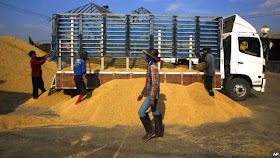The Ebola outbreak in Africa is beginning to have an impact on agriculture and shipping as far away as Asia, with Thailand’s rice industry among the first to experience a serious impact, reports Voice of America.
Africa is a major market for Thailand’s rice, but the industry is finding it difficult to meet demand.
 |
| Thai workers unload rice from the truck of a farmer, at a rice collection center, in the northeastern province of Roi Et, in Thailand |
Exporters in Bangkok say Africa consumes nine million tons of rice annually and two-thirds of it is imported. But they are currently unable to ship much of their crop to West African ports.
Operators of dry bulk vessels cannot find crews to man their ships because of fears of possibly contracting the deadly Ebola virus, according to Vichai Sriprasert, honorary president of the Thai Rice Exporters Association.
“Merchants in West Africa are trying to build up stocks to meet the requirements during Christmas sales. They have to buy now in order to have enough stock. But if we cannot find enough vessels to go there this would jeopardize the whole trade situation,” said Vichai.
So far this year, Thailand, has shipped more than 3.3 million tons of rice to Africa - a pace far ahead of last year’s total shipments of 3.75 million tons. The top destinations, in terms of volume, are Benin, Côte d'Ivoire, South Africa, Cameroon, Mozambique and Nigeria, in that order.
Not being able to ship rice quickly during this peak season is creating a bottleneck, with Thai exporters' warehouses already filled. Vichai said that is creating a chain reaction in the rice industry all the way back to the farmers.
“We cannot release the rice out of the warehouse and also cannot buy rice from the millers. And the millers' warehouses are also filled up. If they cannot sell to exporters they also cannot buy from the farmers. The price of rice from the farmer also has to drop because not too many people can afford to buy. There's no place to keep the stock,” explained Vichai.
Asia’s rice could become even more in demand in weeks and months ahead, with the Ebola outbreak expected to become worse before it improves.
The U.N’s Food and Agriculture Organization warns food in countries affected by the deadly virus has become more expensive. The FAO says some African farmers cannot reach their fields and food imported by ship and air is now unlikely to arrive as often.
Vijay Satia, the former president of the All India Rice Exporters Association, said he is confident Asia’s food cargo will still be able to reach African destinations, but at a higher cost.
“People will ship their material to the alternative ports where this problem is less, maybe taking their material by road or by rail. So costs of rice for the consumer can go up and price for exporters to the lower side,” said Vijay.
Shipping industry analysts say the problem of crews refusing to go to African ports is not yet at a crisis level, although some seaports are losing traffic. But they describe dry bulk ship owners as growing increasingly worried that if their vessels enter countries where Ebola is present, the next port of call may not allow their boats to dock.
The analysts say they have also not noted any serious disruption of shipments of major exports such as bauxite, aluminum and iron ore from mineral-rich West Africa.
But Nigeria’s Shipping Position Daily newspaper reports European ship owners have increased freight rates for cargo and imposed surcharges on crews coming into the West African countries battling Ebola.
The World Health Organization says Ebola has now killed more than 1,500 people in Guinea, Liberia, Sierra Leone and Nigeria.
Read more HERE.
The Global Miller
This blog is maintained by The Global Miller staff and is supported by the magazine GFMT
which is published by Perendale Publishers Limited.
For additional daily news from milling around the world: global-milling.com

No comments:
Post a Comment